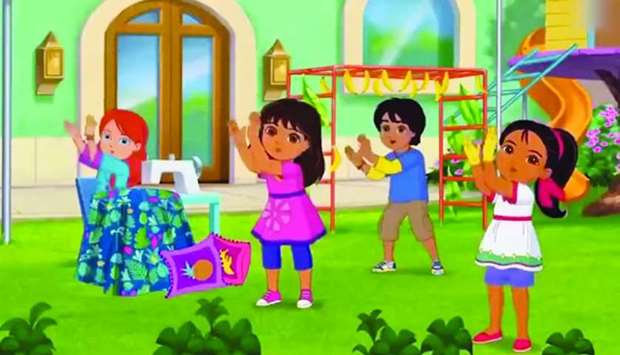In blatant violation of childhood innocence, Saudi Arabia welcomed the New Year with a new hate speech-ridden children's song composed against Qatar.
The song titled “Pour, oh Rain, in Doha” is accompanied by an illustration showing children at play and wishes for the drowning of Qatar, at times, and considers it a Saudi province, at others.
The song promoted on Twitter by Saudi journalist Khalid Almatrafi caused unprecedented anger and resentment on social media , and activists urged the Human Rights Watch to intervene and stop what was described as ‘disgusting’ by some, since it destroys what is left of human bonding between people in the Gulf and is directed at further injecting the seeds of hatred, division and discrimination among children.
Strategist and political analyst Andreas Krieg described the Saudi song on his Twitter account as a “dangerous new development in the Gulf crisis". Krieg who is also a fellow at Institute of Middle Eastern Studies added that the song “sow[s] the seeds of hatred among the youngest”.
Meanwhile, Qatari journalist Jaber al-Harami criticised the song and labelled it a “well-worn song,” adding that after the blockading countries failed to confront Qatar via politics, economics and media, they have now resorted to the production of songs. For his part, social media activist Nasser al-Nuaimi said the blockading quartet utilised children in the Gulf crisis after their failure in inciting violence between the people of the Gulf countries.
The song is not the first production of its kind by Saudi Arabia against Qatar. In September of 2017, singers from Saudi Arabia produced a hate speech-filled song dubbed “Teach Qatar". The song was written by minister and adviser at the Saudi Royal Court Turki al-Sheikh, who is also, ironically enough, chairman of the Islamic Solidarity Sports Federation. The irony is the song which al-Sheikh wrote is filled with hate speech and hate propaganda against Qatar, though he chairs the federation which has the mission of "increase[ing] co-operation between the Islamic countries through sports".
The song also is not the first Saudi anti-Qatar work of art oriented towards children. Since the launch of the blockade against Qatar, social media users from the quartet have circulated short videos in which children were indoctrinated and taught to memorise hate speech words against Qataris. Some of these hate videos were removed by Twitter upon realising its hate and violence-inducing content.
The hate activity against Doha on social media was not limited to the misuse of art. The religion of Islam was politicised and exploited when Qataris and residents of Qatar were banned from entering Saudi Arabia to perform Haj and Umrah. The hate activity by the blockaders also included having social media activists spread rumours and instigate violence against Qataris.
In June 2017, Saudi Arabia, the UAE, Bahrain and Egypt imposed a land, air, and sea blockade against Qatar, listing some accusations which Doha has denied and totally rejected.
The song titled “Pour, oh Rain, in Doha” is accompanied by an illustration showing children at play and wishes for the drowning of Qatar, at times, and considers it a Saudi province, at others.
The song promoted on Twitter by Saudi journalist Khalid Almatrafi caused unprecedented anger and resentment on social media , and activists urged the Human Rights Watch to intervene and stop what was described as ‘disgusting’ by some, since it destroys what is left of human bonding between people in the Gulf and is directed at further injecting the seeds of hatred, division and discrimination among children.
Strategist and political analyst Andreas Krieg described the Saudi song on his Twitter account as a “dangerous new development in the Gulf crisis". Krieg who is also a fellow at Institute of Middle Eastern Studies added that the song “sow[s] the seeds of hatred among the youngest”.
Meanwhile, Qatari journalist Jaber al-Harami criticised the song and labelled it a “well-worn song,” adding that after the blockading countries failed to confront Qatar via politics, economics and media, they have now resorted to the production of songs. For his part, social media activist Nasser al-Nuaimi said the blockading quartet utilised children in the Gulf crisis after their failure in inciting violence between the people of the Gulf countries.
The song is not the first production of its kind by Saudi Arabia against Qatar. In September of 2017, singers from Saudi Arabia produced a hate speech-filled song dubbed “Teach Qatar". The song was written by minister and adviser at the Saudi Royal Court Turki al-Sheikh, who is also, ironically enough, chairman of the Islamic Solidarity Sports Federation. The irony is the song which al-Sheikh wrote is filled with hate speech and hate propaganda against Qatar, though he chairs the federation which has the mission of "increase[ing] co-operation between the Islamic countries through sports".
The song also is not the first Saudi anti-Qatar work of art oriented towards children. Since the launch of the blockade against Qatar, social media users from the quartet have circulated short videos in which children were indoctrinated and taught to memorise hate speech words against Qataris. Some of these hate videos were removed by Twitter upon realising its hate and violence-inducing content.
The hate activity against Doha on social media was not limited to the misuse of art. The religion of Islam was politicised and exploited when Qataris and residents of Qatar were banned from entering Saudi Arabia to perform Haj and Umrah. The hate activity by the blockaders also included having social media activists spread rumours and instigate violence against Qataris.
In June 2017, Saudi Arabia, the UAE, Bahrain and Egypt imposed a land, air, and sea blockade against Qatar, listing some accusations which Doha has denied and totally rejected.

